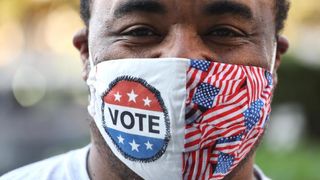Since the first person was diagnosed with COVID-19 in the United States, more than 10 million cases have been confirmed and nearly a quarter of a million people with the virus have died.
Watching from afar, in a country where per capita cases have only been about 3 per cent and deaths 5 per cent of the American figures, it is surprising the incumbent president did as well as he did.
Watching from afar, in a country where per capita cases have only been about 3 per cent and deaths 5 per cent of the American figures, it is surprising the incumbent president did as well as he did.
While the pandemic probably did cost him votes, surveys we have run over the course of the year showed that there are strong partisan effects on attitudes towards COVID-19, with supporters of Donald Trump mostly unconcerned about the risks from the virus, and getting less worried as the year went on.
These surveys were run in May and September, as part of a project with Simon Jackman at the United States Studies Centre, Andrea Carson at La Trobe University and Leah Ruppanner at the University of Melbourne. Both surveys consisted of responses from more than 1000 Americans.
In May, approximately 40 per cent of all Americans were very or extremely worried about the possibility that they or a family member might catch the coronavirus. Almost the exact same number were only a little or not at all worried. According to our data, this level of concern actually declined slightly between May and September, with 34 per cent of respondents saying they were very or extremely worried in the second survey.
This was largely a partisan affair. Respondents who said they were going to vote for Democratic candidate Joe Biden retained a similar level of concern during this period, with 48 per cent very or extremely worried in May, and 50 per cent in September.
However, respondents who said they would vote for Trump in our survey were not very concerned about COVID-19 in May – with about 19 per cent reporting they were very or extremely worried about the coronavirus in the first survey and just 11 per cent reporting this level of concern in the second survey.
The partisan differences, and the declining trend in Republican concern about COVID-19, are largely the product of the extremely polarised media and political environment in the US.
The partisan differences, and the declining trend in Republican concern about COVID-19, are largely the product of the extremely polarised media and political environment in the US.
Previous research we have conducted has shown Republicans have little trust for many important institutions of civil society. Other research with our colleagues at La Trobe University and the University of Melbourne has shown Trump voters are less trusting of information on COVID-19 from medical experts than Biden supporters, and between May and September a quarter of Republican voters became less likely to trust information from these experts.
This difference may, in part, stem from the media through which they obtain information. Those with the lowest levels of trust tended to rely upon more conservative cable and online news like Breitbart and Fox News, for instance, which have played down the risk posed by the pandemic.
Republicans that rely more on these conservative media outlets were more likely to have lower levels of trust in medical experts, even after controlling for demographic differences between Democrats and Republicans. They were also as likely to trust Donald Trump as medical experts for information on the coronavirus.
This division is not new, though, and not only about COVID-19. It is one component of a trend in partisan polarisation that extends to trust in institutions and experts more broadly. Our research has shown exceptionally low levels of trust in institutions among Republicans, produced by several decades of intense criticism of the media, academia, government and experts by much of their party's leadership.
In this polarised environment, very few voters abandoned Trump between May and September (only about 4 per cent in our data), and hardly any of these shifted their support to Biden.
Rather than Trump supporters changing their votes in response to the virus, they adopted positions on the virus consistent with their political allegiance. Relying more on media outlets that downplayed the significance of the coronavirus, and taking cues from Republican leaders, they decided the pandemic was not a significant threat.
Instead, our data indicates Biden was only able to win over a small number of voters who did not support either candidate at the beginning of the year. Enough to win the election, but not enough to stop it from being relatively competitive.




